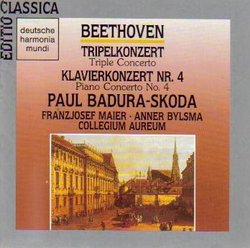| All Artists: Ludwig Van Beethoven (composer), Paul Badura-Skoda (Fortepiano), Franzjosef Maier (Violin), Anner Bylsma (Cello), Collegium Aureum Title: Ludwig van Beethoven: Triple Concerto in C Major, Op. 56 / Piano Concerto No. 4 in G Major, Op. 58 - Paul Badura-Skoda / Franzjosef Maier / Anner Bylsma / Collegium Aureum Members Wishing: 0 Total Copies: 0 Label: RCA Release Date: 9/5/1991 Genre: Classical Styles: Forms & Genres, Concertos, Historical Periods, Classical (c.1770-1830), Instruments, Keyboard, Strings Number of Discs: 1 SwapaCD Credits: 1 UPC: 054727706325 |
Search - Ludwig Van Beethoven (composer), Paul Badura-Skoda (Fortepiano), Franzjosef Maier (Violin) :: Ludwig van Beethoven: Triple Concerto in C Major, Op. 56 / Piano Concerto No. 4 in G Major, Op. 58 - Paul Badura-Skoda / Franzjosef Maier / Anner Bylsma / Collegium Aureum
CD Details |
CD ReviewsA referential pattern: a musical document! Hiram Gomez Pardo | Valencia, Venezuela | 06/18/2006 (5 out of 5 stars) "
Beethoven's triple concerto was composed in 1803 and 1804; a legitimate descendent of the sinfonia concertante, which enjoyed great popularity towards the end of XVIII century. It' s visible to underline the fact Beethoven's striving to achieve within the movements of a cyclical work. This is certainly one of the most brilliant and innovative works of this genius. The overall approach emphasizes the fortunate meeting of the chamber work sound joined with the great symphonic masses. But if you listen carefully , you will realize the Dionysian mood throughout the Op. The three main soloists instruments do not contend in order to reach a an unique leadership. They work out if you may, as a solid functional unity, such as a new musical instrument, that merges and never subordinates to orchestra musical speech. Franz Josef Maier in violin and Anner Bylsma (one of my preferred cello soloists, due to the purity and deep expressiveness of his sound) made a superb team with this emblematic and masterful pianist; a true giant of the keyboard: Paul Badura Skoda, a pianist of countless virtues, skillfully gifted, with meridian musicality and vigorous enthusiasm and profound devotion. To talk about the Collegium Aureum is to refer ourselves to one of the most solid musical ensembles along the musical stages. Recorded in 1974.. Beethoven `s fourth piano concerto is definitively the most complete, sumptuous and complex Opus among the rest of the set of concertos. It possesses a flaming vitality, sweeping musicality and engaging captivation. How difficult results to play it successfully, because it' s far to be a romantic, nostalgic or indulgent piece; as most of Beethoven's works his music patterns must be found in much more expansive platforms; mythical roots, cosmic patterns or Greek ancestors. His music is effect and not cause, and in which final intentions concern, it does not obey to referential models, you may find influential traces of Mozart, Haydn or Clementi but the whole result escapes to any possible label or possible configuration. That's what explains, the reduced numbers of successful players who have shone playing Beethoven. You need to possess a cultivated mind, an elevated spirit and an absolute sense of the expansive significance of the unsaid immersed values beneath the score. Fortunately, Badura Skoda possesses all these requirements (he played with Furtwangler in his early youth), a solid culture, a profound domain of the thematic material, a bulletproof conviction around everything he plays. He is therefore, a performer who not only thinks, researches and studies, but who gives systematic expression to his thought. This approach of the Fourth Concerto is one of the purest, brilliant, enigmatic, eloquent and unerring performances I have ever heard in my life. Recorded in 1972. So it's useless to affirm you should acquire this musical document. " |

